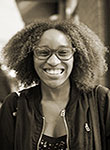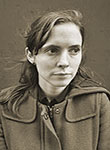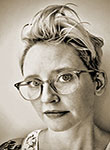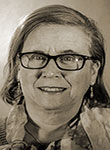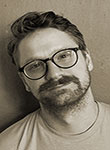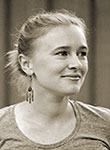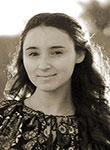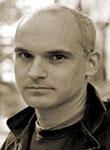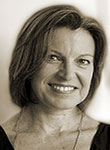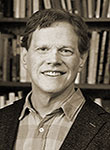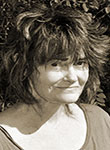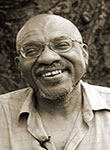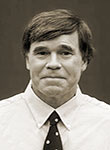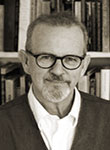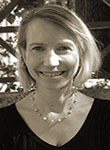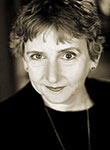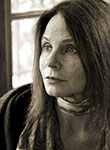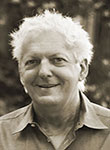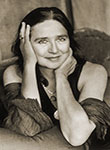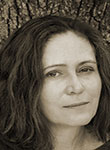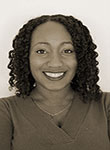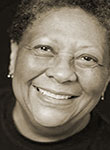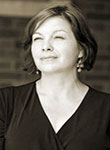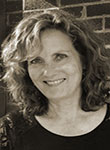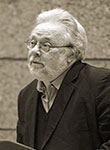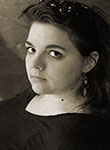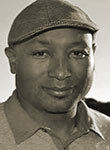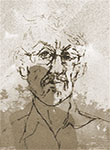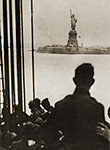Each spring, Blackbird’s Introductions Reading Loop recognizes new artists of note whose work strikes us as exceptionally fine and full of promise. Joining this company for 2019 are poets Holli Carrell, Zach Hester, Joey Kingsley, and Amy O’Reilly; fiction writers Ciera Burch, Emily Chiles, and Gwen E. Kirby; and nonfiction writer Sarah Golin.
Holli Carrell’s poem “Two Women” presents a dreamlike landscape where “Two women rise into my sight / through wisps of mist.” With precise language and imagery in service to an abstract meditation on elemental properties of female ornament and use, she tells us, “Their dark skirts pulse // and mottled black moths / flutter out.” Finally, “Their blouses are stained / with the rust // of yesterday’s blood: / they have learned // to wear it like jewelry.”
Zach Hester’s poems strike a tone more grounded in the world we see now, offering a darkly humorous critique of American consumerism. In “End Times” the speaker observes “We’re running low on fuel / at the pump but thank God // a triceratops was here / and now my champagne // ’96 Nissan Maxima has gasoline / for Taco Tuesday.”
In her crown of sonnets “Limits of the Burning World,” Joey Kingsley traces how divinity might inform daily life and reality, and she employs an October landscape “in tandem, turning red to wine, lime to yellow” for her exploration. Kingsley’s bodies become the maps that lead us through the fire and beyond forgiveness as “an act / of raking yourself into yourself without an end in sight.”
Tangled in the myopia of new motherhood, Amy O’Reilly uses her poems to hone our understanding of that experience. In “What Our Son’s Birth Has Taught Us,” a fridge is full of “grape Jell-O mummified” and Tupperware where “inside each cloistered little world // islands of mold germinate.” Juxtaposed against this humor, “Postmortem, Postpartum” investigates postpartum depression with a speaker who confesses “when they cut // him out . . . I felt nothing, and I saw nothing.”
Fiction writer Ciera Burch’s “Neutral Bodies” focuses a different and penetrating eye, this time on the psychological effects of racial inequality and daily injustice. This investigation follows a therapist who is piercingly aware of the language of bodies and the uphill battle of mind over matter for African Americans in modern society. The story flows from the opening line: “If depression were a person, it would take the form of the black body.”
Emily Chiles’s short story “Kansas” imagines the future of Dorothy after The Wonderful Wizard of Oz, when her life on the farm includes a family of her own. Through the methodical thoughts of a mother doing what she must for her children, Chiles considers “what happens to girls when they dream and then grow up.”
Gwen E. Kirby’s “The Best and Only Whore of Cwm Hyfryd” portrays a robust protagonist whose voice rings with the pride of a well-traveled woman who preserves a space wholly her own. “I want to feel how much I can take,” she declares. In the foothills of the Andes, “Patagonia is a land with more sky than earth,” an earth that is rugged and unyielding. Kirby’s speaker finds a sense of place amid such untamed territory: “I never forget that here I am rootless. . .. I know exactly where I am.”
Completing the loop, in “Letters to Genevieve,” memoirist Sarah Golin remembers her dance instructor, Genevieve Jones. With striking pathos, Golin’s essay threads personal narrative and memory with a meditation on art and creation. While highlighting the rise of dance as an art form in the United States in the 1920s, Golin particularly notes the role of art education in recent history. In today’s modern economy, Golin insists on creativity and the imagination.
Our annual presentation of materials related to the VCU Cabell First Novelist Award includes excerpts from 2018 winner Hernan Diaz’s novel In the Distance (Coffee House Press, 2017), alongside a transcript of his Q&A session at Virginia Commonwealth University. In this novel, the desert expands into an endless “blank,” challenging boundaries and breathing new life into the Western genre. A review of the winning novel by Matthew Phipps also appears in Nonfiction.
The fourth annual Claudia Emerson Reading Loop features three previously unpublished poems, one of which, “Eschatologies,” is accompanied by an essay by Lena Moses-Schmitt. In this unfinished poem, Emerson seems to juxtapose her body’s own failing against our failure to preserve the natural world: both are wilting, like the “hothouse flowers / someone brings . . . // in a sleeve / of plastic a tent / where they cannot breathe.” Snapshots of Emerson’s childhood and adult life round out the presentation.
In Poetry, Bruce Bond’s piece “Levinas” explores the metaphysics of living with cats and their status as creatures that draw on human emotions and human necessities. We see, however, that cats strongly resist philosophical reduction as Bond evokes the way our “personal monsters” linger or how our dreams warm us like a brief “patch of sunlight.”
Kelly Cherry’s poems are meditations on time, loss, and memory. In them “the living / Carry with them memories of those they loved” and “ghosts often find themselves lost in translation.” They are haunting poems, but they are also comforting and hopeful: some ghosts “like to play baseball” and “will wait by your side / To make sure you are not dead until you’ve died.”
With haunting imagery and precise language, Kwame Dawes’s poems examine an America of “empty landscapes” where “bones [are] restless in the dark soil.” The speaker of Dawes’s poems cannot escape from nor forget America’s violent history. For him, the descendants of enslaved people will always “arrive in yet another clearing and feel sorrow.” On the other hand, a white man is free to bask in “the communion of trees, the confluence of rivers, / the chapel of light, the synod of forgetfulness.”
Henry Hart’s arresting poems exist in the aftermath of school shootings, delving into the nature of loss and how we cope. “A Teacher’s Story” precisely recounts such an event, and in “Anniversary in the Lookout Tower” Hart creates a world where “night dusts with pink the veined / darkened clouds” and “souls [fly] out / from the mouths of the dead.”
Mark Jarman’s poems “Our Father Who Art Somewhere Now, We Hope” and “Old Haunts” carry the dual weight of elegy and theology while they delve into the essence of “silhouettes and shadows,” “to memory and beyond.” Images of familiar tokens and the ethereal movements of the soul explore the possibilities of presence and absence.
Holly Karapetkova’s poetry illuminates the lives of immigrants and refugees. Borrowing from Greco-Roman mythology and the folkloric Baba Yaga, Karapetkova creates a world where the woods are “a place of always wanting”; “you turn and turn the pages / but the woods are darkening.” “There Are Boats” explicitly features refugees “carrying nothing / but the air beneath them.”
Jesse Lee Kercheval’s translations of Uruguayan writer Idea Vilarinõ’s poems “Cursed Be the Day,” “The Night,” and “Reasons” explore, with compelling voice, the unstoppable force of death, which, like love, is constantly “invading so slowly / so mysteriously.”
In poems that provide insight into the aftermath of loss and the course of grief, Holaday Mason’s speaker declares, “I feel everything. The fire.” Mason’s poems convey the possessiveness of mourning and explore the different ways we grieve—confessing even a certain sexual hunger as a part of the process.
Set in the lushness of the Italian landscape, Edward Mayes’s poems “All Must,” “The Lost Art of Piping Down,” and “Se Non è Vero, è Molto Ben Trovato” pit the abundance of that life against the limitations of time. “We stay on the same pages for hours, / And the days of the same pages get / Longer” until, perhaps, “that story’s too long, / Too high to see above, the time we had / Listening, the time we had with touch, / The time we had tasting” has passed.
Sidney Wade’s keen eye and precise language present our natural world in a way that upends our usual expectation. Documenting a solar eclipse, “Return” takes us into our primeval instincts so that
when the gold
sliver finallyreappeared
animalrelief gushed
out of lungscompressed
by fearwe hadn’t known
abided there.
In Fiction, Constance Adler’s short story “Nonna Tears Apart a Chicken” makes whole cloth from the many sensations a child experiences while listening to the stories of her grandmothers and mothers, feeling “the weight of their lives, the pain, the ragged mess of it all.”
Amina Gautier’s “Hungry, Like the Wolf” reimagines a classic fairy tale by asking what would happen if the wolf in “Little Red Riding Hood” were secretly merciful. What if the grandmother is the hungry one? Are both “starving for freedom” from something?
In her translation of the late Danish writer Inge Pedersen’s “Clouds and Fire Engines,” Marilyn Nelson brings to bear her eye for language on a story that reveals a somewhat quirky, fast-paced moment of familial dynamics. We view the narrative through the eyes of a young daughter, observing a mother and father as they clash, one full of “a stubborn unbreakable humility” and the other always putting out fires.
Nonfiction features a second excerpt from the late Wesley Gibson’s memoir, You Are Here: A Memoir of Arrival (Back Bay Books, 2004). With humor and vivid description, Gibson recounts his move from Richmond to New York City, where he finds himself sharing quarters with a stranger suffering from a mysterious illness that is in all probability AIDS. Gibson recounts his struggles to adjust to a city where “if you’re one in a million there are still ten more just like you.” This grasping for identity and a sense of self permeates the work.
Sonja Livingston’s essay “Holy Water” describes her pilgrimage to the Irish coastline to visit the grotto-enclosed shrine to Saint Brigid of Kildare, a patron saint of Ireland who lived in the fifth and sixth centuries. Water flows from Brigid’s Well and courses through Livingston’s retelling of her trip: “Water is holy. Our teachers did not say this. They would not sully their science lessons with such a word,” though, in the essay, the shrine is anything but sullied. An audio capture of a lecture about her research into Catholic iconography appears in Features.
Debra Nystrom’s memoir “Haven’t I Been Sweet to You” examines family grief through the parallel separations of the death of her mother and the incarceration of her brother. In moments of the deepest pain, she tells us, “real life—the smallest, unsolved, impossible details of what someone’s been through or is capable of—shows there’s no one who doesn’t need solace, or forgiveness.”
David Wojahn uses his essay “Ferocious Lullaby: Notes on Poetry and Parenting” to probe the disparate roles of poet and parent and how a poet attempts to balance the two. While discussing the works of Adrienne Rich, Craig Morgan Teicher, and Muriel Rukeyser, among others, Wojahn looks to dismantle the myth of the isolated poet while also exploring the romanticization of the poet and “writerly self-absorption” practiced by poets like Rainer Maria Rilke, Wallace Stevens, and Jack Gilbert. He finally declares that parenthood has made him “less lofty in my sense of the poet’s calling.”
Dana Calhoun reviews recent work by Thomas Pierce, Christian Detisch examines Ilya Kaminsky, Caitlin Etherton looks at Jessie van Eerden, and Weston Morrow takes on Abigail Chabitnoy to round out the section.
In Gallery, David Freed’s exhibition Strings showcases the intimate links he traces in choosing and realizing his subject matter. Strings features delicate line work on unique Khadi paper in addition to woodcuts, watercolor, pastel, and collage.
Also in Gallery, Bridget Grace Sheaff’s play, Exit Interview, cleverly re-renders a breakup between a boyfriend and girlfriend—Brandon and Nicole—in the form of a corporate exit interview. Nicole conducts a sometimes desperate, often funny, finally heartbreaking attempt to get answers from Brandon about his reasons for leaving her, all the while avoiding her crucial question: “Did you ever really love me?”
The 1918 Suite, continued from v17n2, collects additional testimony to the consequences of the influenza pandemic in the early years of the last century. Text collected from such disparate sources as Willa Cather’s novel One of Ours and a sermon by Washington, D.C., preacher Frances J. Grimké accompany various images from the period.
Audio presented in the issue includes readings by T. Geronimo Johnson and T.R. Hummer. Johnson, who appeared at the James Branch Cabell Library at Virginia Commonwealth University in September of 2018 reads a failed comedy routine by a character in his novel Welcome to Braggsville (HarperCollins, 2015) as well as an excerpt from a work in progress that reimagines the genre of the slave narrative. Hummer read in tandem with Gregory Donovan and Michele Poulos at Chop Suey Books in Richmond in November of 2018. Each of the three read from their published collections of poetry, and Hummer also read new poems.
Additional readings by Roselyn Elliot, Nathan Long, Emilia Phillips, and Michele Young-Stone complete the issue. ![]()
Return to top menus | Browse issue
